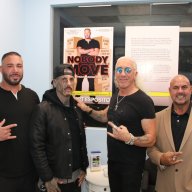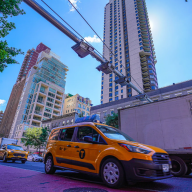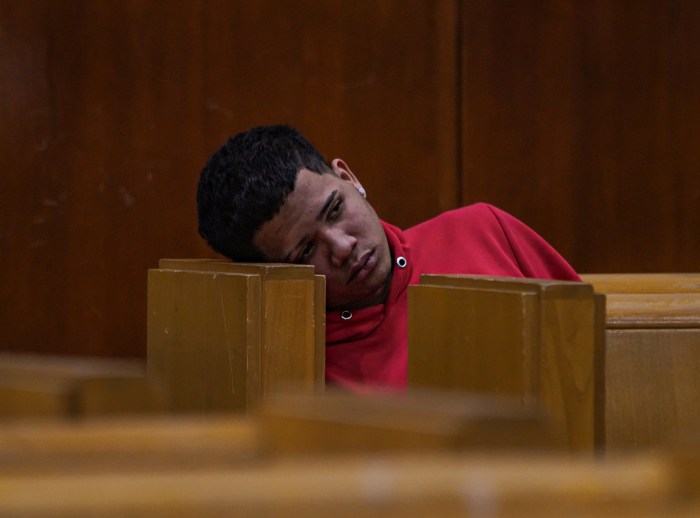State to get billions from bipartisan bill
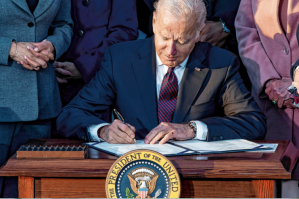
(Official White House Photo by Cameron Smith)
It’s going to take lots of money to make up for decades of neglect and underfunding as well as preparing for the looming challenge of climate change on our nation’s “hard” infrastructure—roads, bridges, dams, water treatment plants and the like. That money will be now be forthcoming.
Months of protracted negotiation and compromise have produced the $1.2 billion Infrastructure Investment and Jobs Act (IIJA), signed into law by President Joseph R. Biden on Nov. 15.
It was a milestone that eluded several of Biden’s predecessors, who made grand plans but failed to craft a package to secure congressional approval,
The American Society of Civil Engineers gave a grade of “C minus” to the nation’s infrastructure in its March 2021 report.
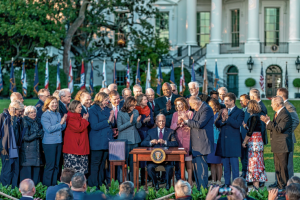
(Official White House Photo by Cameron Smith)
IIJA will funnel up to $28 billion into New York State over five years. State officials will have discretionary spending authority to fund a long list of projects. As Senator Tim Kennedy (D–Buffalo), chair of the Transportation Committee, told the New York Times, the state “has more than 1,700 bridges and 7,300 miles of local roads and highways considered to be in poor condition.”
All of New York’s Democratic representatives, as well as Democratic senators Chuck Schumer and Kirsten Gillibrand, voted in favor of the bill. Joining them were state Republican Congressmembers Andrew Garbarino of Sayville, John Katko of Camillus, Nicole Malliotakis of Staten Island and Tom Reed of Corning. The other Long Island representative, Lee Zeldin of Shirley, a Republican running for governor, voted against it.
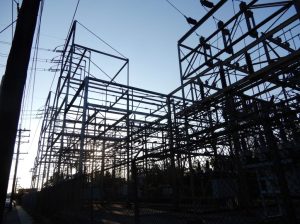
Anton Media Group reached out to both Zeldin and Garbarino for comment, but as of press time it had not received a response. The 13 GOP House members and 19 senators who voted in favor of the bill have faced criticism from their colleagues as well as former President Donald Trump. The Nassau County Police Department arrested Kenneth Gasper of Lake Ronkonkoma, charged with aggravated harassment for reportedly making death threats against Garbarino after his vote.
In a statement, Rep. Thomas Suozzi (D–Glen Cove) said, “The past four presidents have tried, but President Biden and this Congress got this bipartisan deal done. It takes bipartisanship to get things done, and the signing of this once-in-a-generation legislation will rebuild New York and put millions to work. This is about jobs, this is about rebuilding our country, and it’s about showing that we can get things done that have real-life impacts.”
“Today, we delivered the American people a long overdue win—a historic bipartisan infrastructure bill that will create good-paying jobs, fix our crumbling roads and bridges, clean-up contaminated drinking water, and strengthen our economic recovery on Long Island,” Rep. Kathleen Rice (D–Garden City) said. “I thank my colleagues who put politics aside to pass this critical legislation and I am thrilled it will finally be signed into law.”
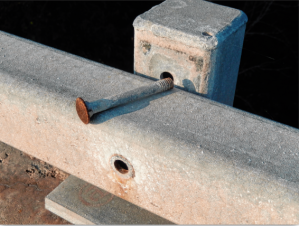
(Photo by Frank Rizzo)
Actual implementation and disbursal of the funds involves long and complex negotiations and discussions among state, local and federal officials. There are also complicated funding formulas to navigate. But there is no doubt that the money will have a significant impact. At a press conference this summer, Senator Schumer stated that under the terms he negotiated in the Senate, he secured a $2.6 billion injection of funds for the Long Island Rail Road and commuter service. A press release announcing the conference noted that “Schumer will say that when he was leading the negotiations on this legislation that he was focused on Long Island, because of how hard COVID hit the Island and its countless commuters.”
Projects mentioned by Schumer included “new ADA stations for the LIRR, Jamaica Capacity Overhaul, LIE safety measures, Heckscher State Parkway Bridge repair, Meadowbrook State Parkway rehab and more. Schumer will say the direct investments in the LIRR alone will help keep 24/7 service in place, help combat service cuts, keep workers working and riders riding.”
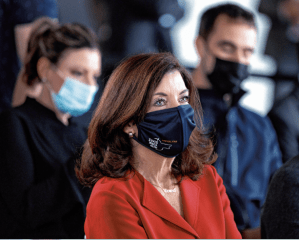
(Mike Groll/Office of Governor Kathy Hochul)
Governor Kathy Hochul commented that, thanks to the bill, fare hikes for MTA riders will be delayed and planned service cuts will no longer be implemented.
The State’s Share
According to various sources, these are the moneys the state will receive under the IIJA:
Highway Funding: $12.5 billion
• $11.5 billion for surface transportation
• $1.9 billion to replace/repair bridges, 10 percent of which are in poor condition
• $142 million for EV charging infrastructure
Airport Funding: Nearly $1 billion
• JFK–$294,682,575
• LaGuardia–$150,008,970
• Long Island MacArthur–$21,595,630
• Republic–$3,735,000
• East Hampton–$1,480,000
• Brookhaven–$1,480,000
Public Transportation
• $9.8 billion for clean buses and mass transit
Miscellaneous
• Broadband: IIJA will allocate $100 million to the state to upgrade Internet access—13 percent of New Yorkers lack access to high-speed internet
• Drinking/Wastewater: IIJA will provide $2.6 billion to improve water infrastructure across the state, which has a $22.8 billion drinking water investment gap
• Resiliency: $34 million for fire resiliency and $28 million to protect against cyberattacks
New York Overview
According to the latest Report Card on infrastructure by the American Society of Civil Engineers:
While the nation’s infrastructure earned a C- in the 2021 Report Card, New York faces infrastructure challenges of its own. For example, driving on roads in need of repair in New York costs each driver $625 per year, and 9.9 percent of bridges are rated structurally deficient. Drinking water needs in New York are an estimated $22.8 billion. Four hundred and twenty-four dams are considered to be high-hazard potential. The state’s schools have an estimated capital expenditure gap of $2.91 billion. This deteriorating infrastructure impedes New York’s ability to compete in an increasingly global marketplace. Success in a 21st-century economy requires serious, sustained leadership on infrastructure investment at all levels of government. Delaying these investments only escalates the cost and risks of an aging infrastructure system, an option that the country, New York and families can no longer afford.






















